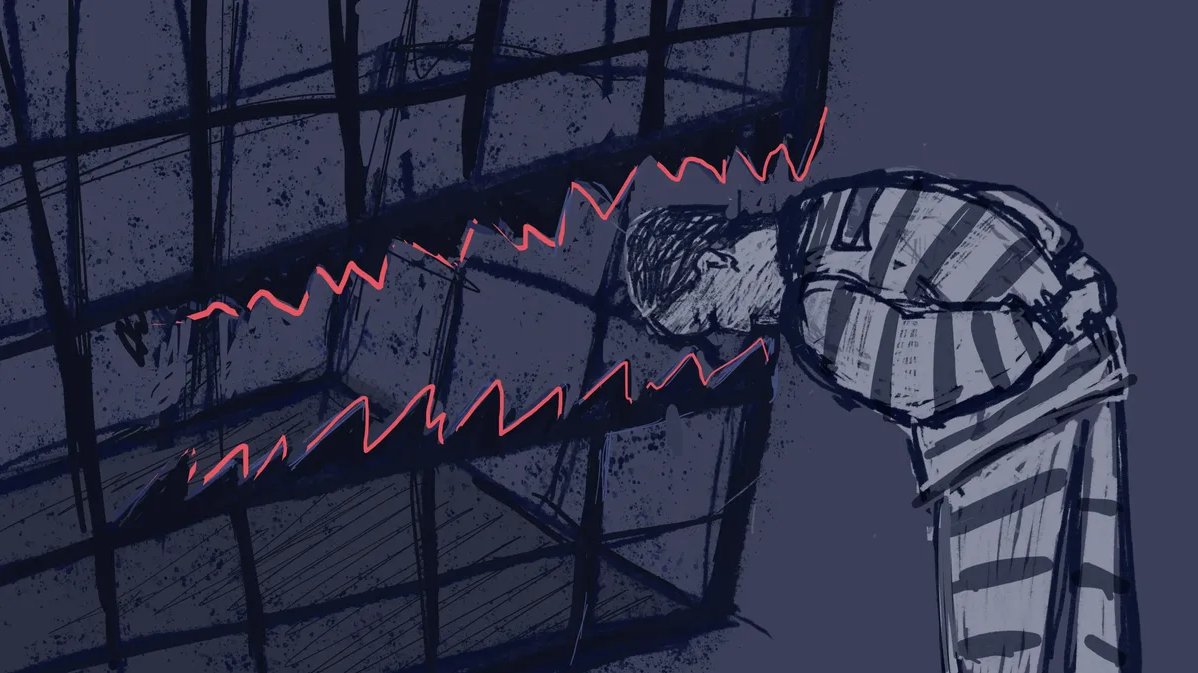Ukrainian convict Oleksandr Fedorenko had less than a year in a Kherson prison left when Russia invaded Ukraine. Russia-installed occupation authorities initially showed no interest in the Ukrainian prisoners, even as shells fell within prison grounds. However, for reasons still unclear, the “officials” later chose to transport these inmates during the Russian military withdrawal from Kherson. The prisoners were first moved to Crimea, and then to Russia, subjected to brutal treatment, and coerced into applying for Russian citizenship.
Fedorenko refused to get the passport, was released in December, spent some time in a deportation prison but ultimately managed to return home via Georgia. In total, the Russian occupation authorities unlawfully deported approximately 2,500 prisoners from Kherson. For many, Russia has become an indefinite prison as the majority are still serving their sentences in the country’s southern regions.
‘Lost and forgotten…’
Oleksandr Fedorenko was found guilty of theft and sentenced to three years and six months behind bars by a Chernihiv region court in 2019. He started serving his sentence in a Bucha prison, but it was disbanded in 2020. From Bucha, Fedorenko was transported to Kherson, southern Ukraine. That’s where he learnt the news that the Russian government had unleashed war on his country.
“We were all following the news but I did not believe that Putin would attack,” Fedorenko says. “I was saying: ‘Guys, he won’t risk it because everyone will start helping us’. I thought that it was clear to everyone.”
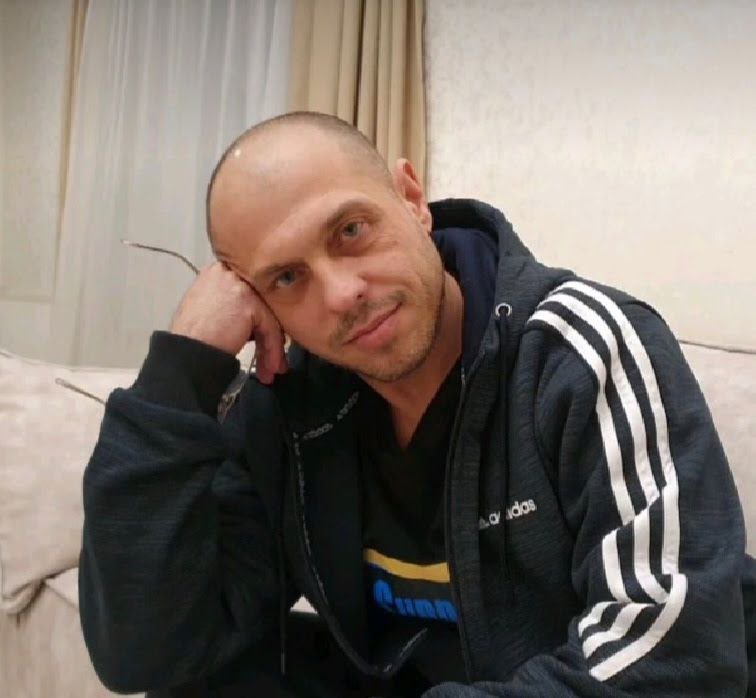
Oleksandr Fedorenko. Photo taken from personal archives
On 24 February 2022, at 4 AM, Oleksandr’s cellmate woke him up and said, “Wake up, man, cruise missiles are attacking Kyiv”.
“I was in shock, I couldn’t believe it,” Fedorenko recalls that day. “Our TV was working 24/7 since then. Everyone was dumbfounded: both the inmates and the cops. I was constantly calling back home in Pryluky (a city in the Chernihiv region of Ukraine — author’s note), they also had clashes there. My sister told me: ‘Sasha (shortened version of Oleksandr — translator’s note), they keep driving in columns’. In the first days, the Russians were stopping to ask locals for food. And the people did feed them, saying that the soldiers are just ‘kids’, they’re hungry’.”
On 3 March, Kherson was fully captured by Russian forces which ushered in a period of uncertainty for the inmates. They were pleading with the prison administration to tell them what’s going to happen but nobody could answer: nothing was for certain.
Lyudmyla Denisova, then-commissioner for human rights of Ukraine, issued a statement only a week later to say that the Kherson prison was overtaken by Russia but claimed that all employees and convicts stationed there had been evacuated.
“No one was evacuated, everyone was left behind in Kherson: prisoners in cells, staffers on their posts,”
a Kherson police officer told Novaya-Europe on the condition of anonymity. “We, police and prison officers, were later told to independently make our way to the territories controlled by Ukraine. But there were no ‘green corridors’ and not everyone was able to get out.”
After learning about the “evacuation”, one of the Kherson prison inmates managed to get through to Denisova’s office by phone but could not get an answer as to why they had been left behind.
Support independent journalism
‘Military stormed in with guns, gave us five minutes to pack up’
“By 6 March, ‘Russia TV’ had already taken over the airwaves, even Ukrainian radio broadcasts were jammed,” Fedorenko recalls, referencing the early changes implemented by the occupation regime. “It was like a scene from a guerilla warfare movie: we were scrambling all over the prison looking for a spot where the radio signal was less interrupted. The cops quickly removed their Ukrainian badges, but the Ukrainian flag kept hanging in our medical unit for another six weeks.”
The prison warden, Yevhen Sobolev, began to collaborate with the invaders from the very first days of the occupation. The new “authorities” appointed him as the head of the Kherson region’s regional office of the Federal Penitentiary Service. When the occupation regime arrived, half the staff resigned, and replacements were hastily recruited — literally from the street.
The Russian occupation impeded Nova Poshta, a Ukrainian express delivery service, from operating within the region. The Russian occupation effectively prevented prisoners from receiving parcels from their relatives. Even basic items like cigarettes vanished from the entire occupied territory, only to reappear a month later at three times the original price.
In May, the Kherson prison started receiving inmates from other detention centres. The inmates were brought from Daryev high-security prison. The Russians also confiscated all the medicines and equipment from there (this prison hospital was considered one of the best equipped in Ukraine), while the seriously ill and bed-ridden prisoners were abandoned. Novaya-Europe could not verify what happened to them.
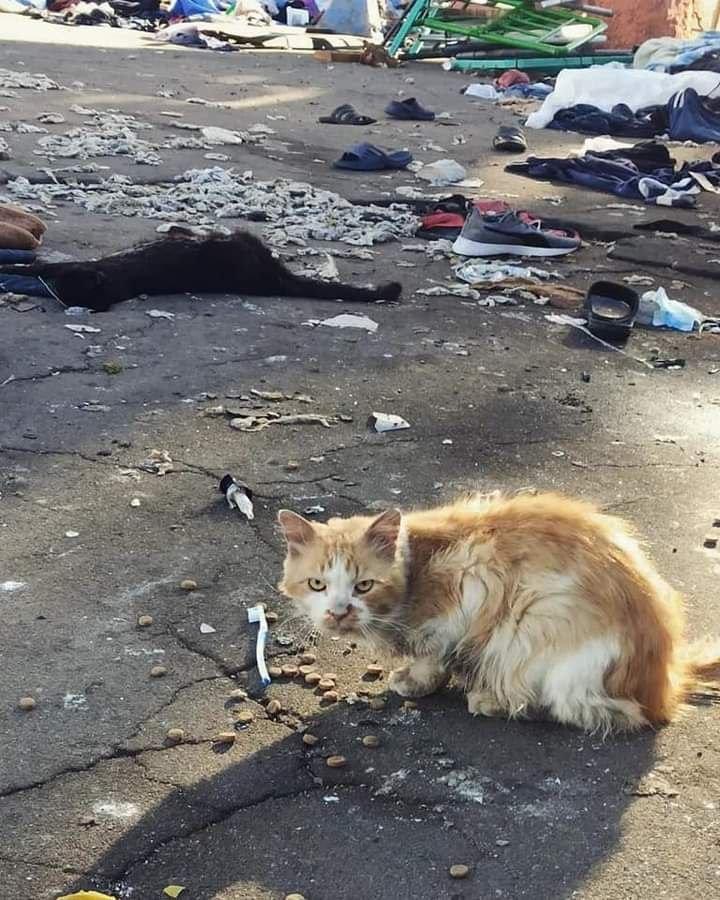
Photo taken by animal rights activists in the Kherson prison following the city’s liberation by Ukraine. Photo: Facebook
Inmates from a prison in Snihurivka (officially designated as IK-5), Mykolaiv region, were later transferred to Kherson as well.
“Those prisoners from ‘number five’ were in a grey zone for over two months without electricity, food, or even water for an extended period (the Russian advance towards Mykolaiv was halted in the Snihurivka area — author’s note),” Fedorenko notes.
“Suddenly, [Russian] soldiers, armed with automatic rifles, stormed in and gave them just five minutes to pack up their belongings. They arrived at our prison in shorts and slippers, just like they were.”
‘I never realised just how much I loved Ukraine’
In Ukrainian prison facilities, tablets with SIM cards removed and cameras disabled were permitted. According to Fedorenko, his prison even had functional Wi-Fi. However, even this semblance of freedom was eradicated with the arrival of the Russian authorities. The inmates’ tablets and phones were taken away, while the occupiers later confiscated TV sets and appliances from the facilities.
“Prisoners had rights under Ukrainian authorities, but all these rights were lost with Russia’s arrival,” Oleksandr continues. “At ‘number seven’ (IK-7 prison in the town of Hola Prystan — author’s note), they would barge into the units and brutally assault the inmates. They even threw stun grenades into the cells in the pre-trial jail.”
Fedorenko recounts a chilling incident when the prisoners were strictly instructed “not to peer out of their cells” but when one inmate “merely peeked out of the food slot, his head was brutally shot off with a machine gun”. According to Fedorenko, it was officially declared that the inmate was attempting to escape and was fatally shot while attempting to scale the fence.
“At the start of the occupation, we weren’t really beaten much. The guys and I thought that it was because of Sobol (Kherson prison chief, Yevhen Sobolev — author’s note),” Fedorenko explains. “He was the ruler of the prison: it was his domain. But we all knew it was in our best interest not to provoke him."
However, the situation soon escalated. “They began to harass us for any remarks. They would bring us to a room and beat us all up. Then they would throw us into ‘the pit’ (underground cell — translator’s note) until our bruises healed.”
In June, the prison officials began urging the inmates to apply for Russian passports, but none of the prisoners were lining up to do so.
The prison where Oleksandr was serving his sentence is situated on the outskirts of Kherson, and the prisoners could almost incessantly hear the sounds of combat in the Mykolaiv direction. Heavy explosions rocked the building occasionally. On both 27 and 29 August, Ukrainian missiles made their way into the prison itself. According to Fedorenko, the missiles “precisely hit a Russian ammo depot, causing it to explode continuously for 90 minutes”.
Remarkably, none of the inmates were injured, despite the fact that the colony provided no safe places to hide during the bombings, lacking bomb shelters or even basements.
“When the bombardment ceased, it made us uneasy,” Fedorenko recalls. “We found ourselves worrying about why our forces weren’t striking against the occupiers. In general, nearly all the inmates supported Ukraine. My friend who woke me up on the morning of 24 February later admitted, ‘I never realised just how much I loved Ukraine.’ We did have political debates among us. Some initially argued that life under Russia would be better, but it didn’t take long to realise that this was not the case.”
Across the Dnipro into the unknown
In October 2022, Russian troops launched a major retreat operation from the right bank of the Dnipro River. As they looted museums, administrative buildings, and private homes, they inexplicably decided to also take Ukrainian prisoners with them.
The rationale behind this idea is still very much unclear.
“Within three days, we were transported to ‘number seven’,” Fedorenko shares. “We crossed the Dnipro on a ferry near the destroyed Antonivka Bridge. There was a group ahead of us that had just crossed the river. The Russians attempted to sneak in their own military equipment [between two prisoner groups], but there was a strike right away.”
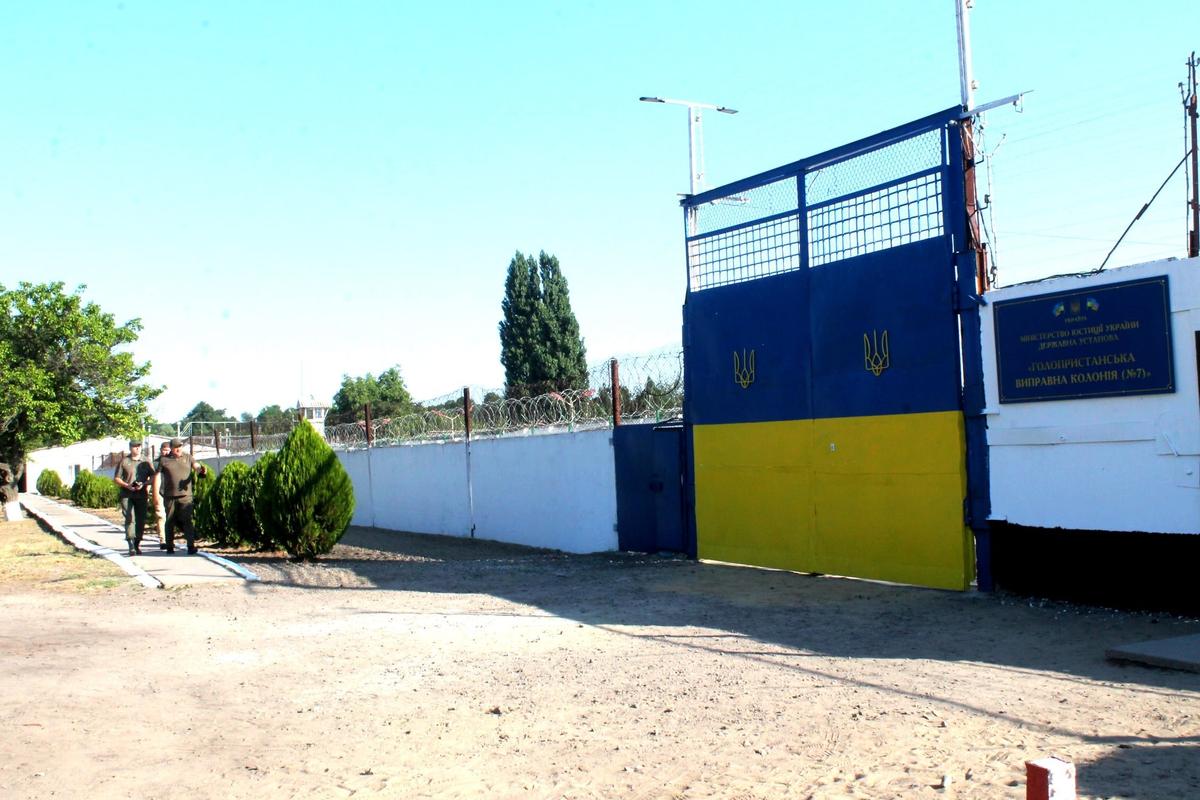
IK-7 prison, Hola Prystan. Photo: VITK
Russian media outlets later claimed that Ukraine had launched attacks on civilians and journalists. “But what civilians could be there during a curfew? We were under occupation and saw firsthand that Ukrainians shoot on target, so we weren’t too worried about ourselves,” says the ex-prisoner.
Fedorenko spent about two weeks in Hola Prystan. There was a cloud of uncertainty, no one knew what was to come and no one asked the prisoners if they consented to be moved. On the contrary, as Oleksandr recalls, it was emphasised that the prisoners would be subject to wartime laws: if anything went awry, they could face execution.
On 20 October, the deputy head of the prison informed the Ukrainian inmates that an order had been issued to ready everyone for evacuation.
The gruelling journey to Simferopol took 17 hours. The transport consisted of ten trucks, each carrying 40 people. As they approached Chongar (an unauthorised border crossing between Ukraine and Russia, currently manned solely by Russian border guards after the Ukrainian post was destroyed by tanks following the invasion— author’s note), their escort took a bag containing personal files, which also held the passports of the Ukrainian prisoners, and handed it to the border guards.
Fedorenko recalls that they were not given any migration documents, and no one paid them any attention. After an hour, the convoy returned to the truck with the same bag, and the journey resumed.
Soviet-style concentration camp: ‘You can piss but no shitting!’
In Simferopol’s pretrial detention facility, colloquially referred to as the FSB prison (the facility was added to the US sanctions list for torturing political prisoners), the arrivals from the Kherson region were treated with brutal hostility and were immediately subjected to physical abuse.
“I stepped off the truck and was instantly seized and thrown to the ground,” Fedorenko recalls. “‘Face down! Against the wall! Address only with ‘Permission to speak’ and ‘Officer Warden’! No eye contact!’ the guards screamed as they beat us up. Everyone got this ‘welcome’, they hit you at least once. Depends how lucky you got.”
Fedorenko’s convoy arrived at night, the prisoners were lined up against the wall, searched but not stripped naked (unlike those who arrived before dawn). The beatings were relentless.
“I was the first one in the cell,” says Fedorenko. “An officer came in, I was standing before him, eyes averted as instructed. He ordered me to look at him. As I raised my eyes, he punched me in the face right away. Again and again… He busted my lip, the bastard… He yelled, ‘You can piss but no shitting!’ That’s the warm welcome we got from Russia. He did this in every cell, hitting the guys and screaming like a maniac.”
Fedorenko describes the Simferopol detention facility as a Soviet-style concentration camp.
“Every two minutes, they would peep through the hole and pound the iron cell doors with a baton, so that no one would dare lie down on the bunk beds.”
“There were people in the facility who were in custody before us. They were deprived of food, water, and even the chance to smoke. They would be beaten when they went out for a walk and beaten again upon their return. It was safer not to leave the cell at all, but how could you manage that?” he recalls the harsh conditions of his incarceration.
Soon, the prisoners from the Kherson region were dispatched once again, but not before all their bags were meticulously searched. Those who didn’t pass the inspection were subjected to yet another round of beatings.
At the Russian prison
The prisoners were reloaded onto trucks and finally arrived at their ultimate destination, a prison in Ust-Labinsk, Krasnodar region, 20 hours later on 22 October. “Immediately upon arrival, they searched us, confiscating everything we had, even medicines, notebooks, photos, everything,” Fedorenko recalls. He had only a month and a half left of his sentence to serve, and asked for an official receipt listing the confiscated items.
“I was about to be released! They should have given a receipt to everyone. But they didn’t,” Fedorenko says, clearly aggrieved. “All our cigarettes were conveniently bagged together, but we never saw that bag again. They even took away the necessary medication from people with HIV and tuberculosis.”
After the search, Fedorenko and his fellow Ukrainian prisoners were sent to the police station for questioning. They were asked about their attitudes toward the “special military operation” (as Russia refers to the Ukraine war — translator’s note), Vladimir Putin, and their tattoos. Those with tattoos representing the crime world, such as stars and other symbols, were slapped with fines of 1,500-2,000 rubles (€17-€23) for promoting A.U.E. — an informal organisation of convicts ruled to be extremist in Russia.
“We still can’t understand this… Can they fine people daily? A tattoo doesn’t just disappear,” Fedorenko wonders.
Fedorenko’s barrack neighbour had a tattoo on his chest featuring a skull with a German helmet and an eagle resembling the German coat of arms. “They had him stripped in Simferopol, put him face down on the floor and yelled, ‘Everyone look, a fascist!’ I had given him Ukrainian army socks back in Kherson, they were long, warm, and comfortable. He’d told me that those socks would eventually get him in trouble, and sure enough, that’s what happened in Simferopol… Luckily, he wasn’t beaten too much. His file noted that he was suicidal,” Fedorenko recalls.
The next day, all the newcomers were assigned to various units. There was no quarantine and no available space in the barracks: the bunk beds were shuffled around and rearranged as best as possible.
“Compared to our Ukrainian prisons, the conditions in the Russian ones are dreadful,” Fedorenko says. “The inmates came to us, offering us tea and cigarettes. Phones were banned, packages were allowed only once every three months, and the overall level of deprivation and bitterness was palpable. Yet, they treated us fairly well. According to prison norms, convicts are always non-political. Russian convicts, on the other hand, were often surprised and envious of the conditions in our prisons. Everything in Ukraine is more humane, more in line with prison standards. And even though there are many convicts in Russia, things just aren’t humane.”
In the Russian prison where Oleksandr was taken, the relations within the facility were generally manageable. But the same cannot be said about other places where prisoners from the Kherson region were sent.
Olga Romanova shared a report from an inmate in a Volgograd region prison: “Prisoners from Kherson were brought here. They transferred 140 people. They stand there, not daring to raise their eyes, trembling, and clearly undernourished from their journey. They were confined to empty barracks and given only spoons. Everything was previously removed from the barracks: kettles, microwaves, dishes. Only the bunk beds, a table, and spoons remained. I don’t know how they will survive; it’s horrifying.”
‘All Russian convicts view the war through rose-tinted glasses’
Oleksandr Fedorenko mostly faced technical issues while in the Russian prison: it was difficult to contact his family and almost impossible to receive money transfers from Ukraine: he had to resort to middlemen to get the cash.
“Some guys had their medication taken away, but I managed to keep mine,” Fedorenko recalls. “Then I went to the medical unit to ask about treatment. I didn’t know how long they would keep me in Russia, and I needed to know what to expect. The system of medical visits was striking. How is it done in Ukraine? If you’re sick, you go to the medical unit and see the doctor. But here, a staff member of the colony escorts you in and out. Everything is tense and getting to see a doctor is very challenging.”
What stood out to Fedorenko the most was the “window in the wall from the corridor to the [doctor’s] office”. “I thought it was placed too low. The next time I went, I saw that prisoners were getting injections through it. The doctor stays inside the office, while the prisoners stick their bare bums through this window to get the jabs,” he describes.
Meanwhile, Ukrainian prisoners refused to be vaccinated against COVID-19. “What for? The only thing they can do properly in Russia is Novichok (nerve agents that were used to poison Alexey Navalny as well as Sergey and Yulia Skripals — translator’s note),” Fedorenko jokes.
On the second day, a unit officer approached him and asked, “Will you get [Russian] citizenship?”
“I won’t,” Fedorenko responded.
“Why not?”
“I’m an ethnic Ukrainian. I want to remain a citizen of Ukraine.”
“Too bad. You won’t be released now,” the officer threatened him.
Local prisoners informed him that foreigners who completed their sentences were typically met by migration services at the colony gates and transferred directly to deportation prisons.
According to Fedorenko, there were several Ukrainian prisoners who accepted Russian passports, but these people were permanent residents of the occupied territory in Kherson region and there was no other way for them to return home. They were released without any issues.
Despite the unit officer’s warning, Fedorenko wrote a statement refusing Russian citizenship, as he intended to return to Ukraine. He understood that if he accepted the passport, he could be drafted into the Russian military.
“A representative from the [mercenary] Wagner Group visited us for the second time, as far as I understood,” Fedorenko notes. “The prison management knew in advance that he was coming. Anyone who wanted to could sign up. The first batch had 300 people, the second, which took place during our stay, had 270. But some were disqualified for health reasons. Many said they didn’t want to fight, but saw this as an opportunity to escape the prison. None of us [Ukrainians] signed up in my presence.”
According to Fedorenko, the Russian inmates “view the war through rose-tinted glasses”. “You can understand them, though,” he says. “The conditions in Russian prisons are so awful that any chance to escape is taken. I tell them they’ll be sent to the Bakhmut meat grinder, where more than half of the recruits have already died but they don’t believe me. Everyone thinks they’ll be the lucky ones who survive. Some are even willing to die immediately to avoid suffering, hoping that their families will receive the cash payouts afterward.”
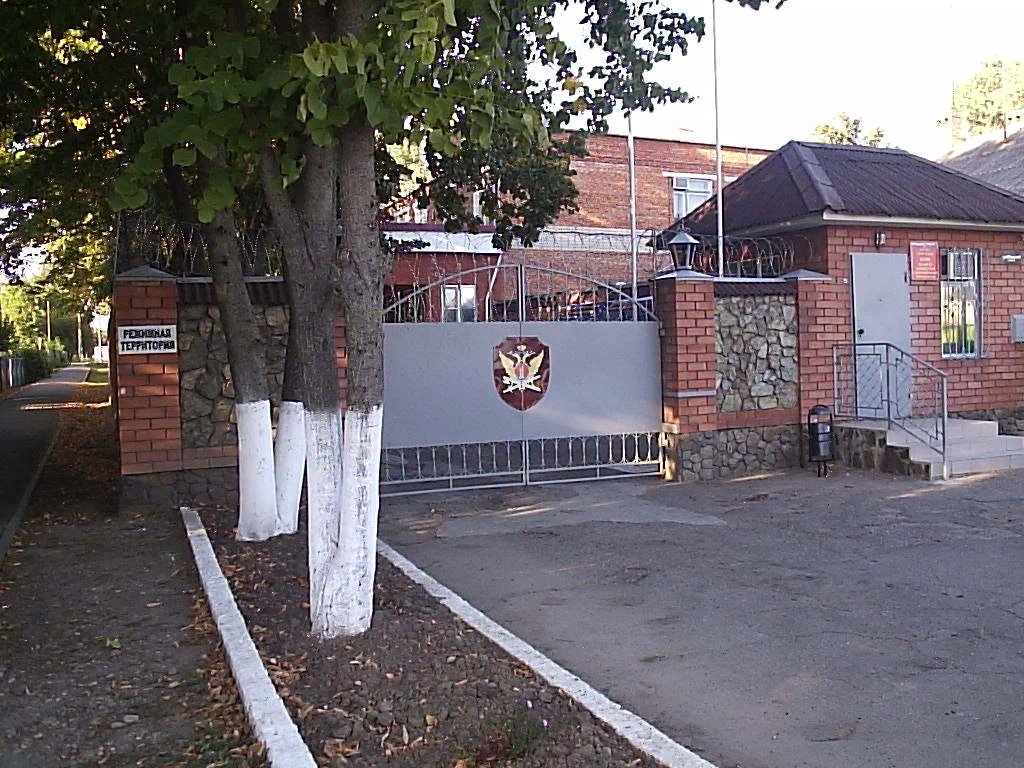
The Ust-Labinsk prison. Photo: Yandex.Maps
‘Judges in Russia don’t make decisions on their own’
Fedorenko maintained hope of avoiding a deportation prison, as his Ukrainian passport was kept in his personal file. The Russians had brought him to the country, and he was certain that the border guards had seen his passport.
On the long-awaited day at the checkpoint, a policewoman handed Fedorenko his documents, which included his passport and a certificate of release from prison (available in the editorial office). They also gave him 2,000 rubles (€23) for a ticket and 700 rubles (€8) for clothes. Fedorenko hoped that he would receive his personal belongings back, since his puffer jacket was among them, but he was forced to leave in just a shirt.
“When I got out, I saw a man from the migration service,” recalls Fedorenko. “I immediately realised I was about to be taken to the migration prison.”
They drew up a report accusing him of violating the rules for foreigners staying in Russia and took him to court.
“I was at the judge’s office later that day,” Fedorenko says. “There was an older man in a shirt without a jacket.”
“Has the trial already started? Like this?” Fedorenko asked.
“Yes,” the man answered.
“But where’s my lawyer? Where’s the prosecutor?”
“Why do you need a lawyer? How can they help you?” the judge seemed surprised.
Fedorenko explained to the judge how he ended up in Russia and suggested that he write a statement affirming his commitment to leave Russia within 24 hours.
“He listened to everything and then said, ‘Well, you see, I can’t let you go’. Judges in Russia don’t make decisions on their own, as I understand it,” concludes Oleksandr.
‘Fortunately, they let me out of this state which is just one giant prison’
After the trial, Fedorenko was taken to a migration centre in Novoukrainskoye, a settlement in the Krasnodar region. No one knew the deportation date, and Fedorenko, having just been released from prison, essentially became an indefinite detainee there.
“Our situation was very uncertain,” he says. “There were people there who had been waiting for deportation since February 2022. I was held there for about 45 days, and finally, on 25 January 2023, at around 6 PM, I was released. They let us go with no money, wearing prison uniforms, in the middle of the night. I was lucky that people helped me with clothes, and my sister managed to send me money from Ukraine through my prison connections.”
Fedorenko and one other newly-released man rented a hotel room. In the morning, Fedorenko bought a tracksuit and a jacket at a market. He stayed in contact with human rights activists, who advised him to go to Georgia and promised to assist him in returning home from there. Fedorenko purchased a train ticket to Vladikavkaz, and then journeyed to the infamous Verkhny Lars checkpoint (which faced many-kilometre long queues of Russian fleeing mobilisation when it was announced in September 2022 — translator’s note).
“I showed them my passport and liberation certificate, and it seemed like they already knew that people like me could be coming,” he says. “They took me to an office where a warrant officer asked me all the details, and then kept making phone calls.”
The border guard explained to Fedorenko that released prisoners without a [Russian] passport would not be allowed out of the country.
“‘They haven’t given an answer about your case yet either,’ he said, and my heart sank at these words,” Fedorenko recalls. “But thankfully, I was released from this state, which is essentially just one giant prison. A guy took me across the border on a lorry. I was surrounded by mountains, it was the first time I had ever seen mountains. I also finally left Russia. It was a feeling of pure joy.”
P.S.
Fedorenko managed to hitch a ride to Tbilisi where activists purchased a plane ticket to Moldova for him. He then managed to get to his native city of Pryluky. “A few people managed to enter Ukraine the same way,” he says. “But it’s all quiet now, they are not letting anyone out. The guys who are placed in the Novoukrainskoye detention centre say that it’s filled with released Kherson convicts. There were about 80 of them in April. There are rumours that only those with passports will be let out. Families find ways to ship documents from Ukraine to Russia for their convicts but they are still held in the migration prison.”
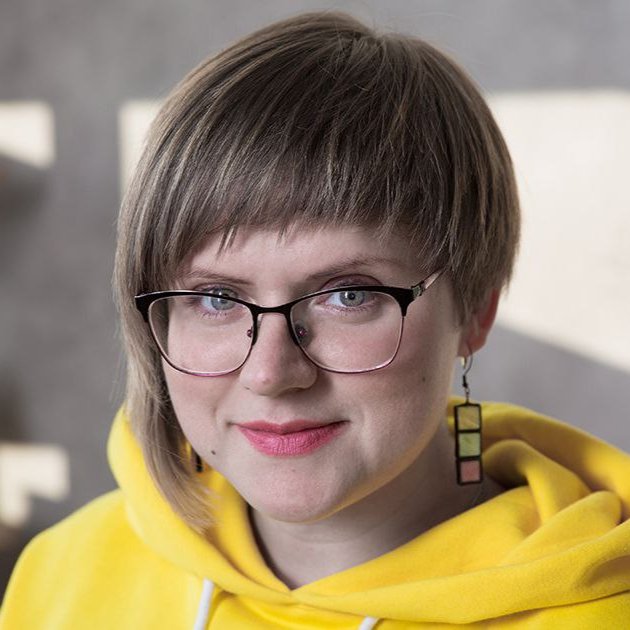
Alena Lunova
Ukrainian Human Rights Centre ZMINA
‘Convicts are essentially civilian hostages’
“Convicts from the Kherson region were practically deported, many of them are still illegally held in Russia. They were transferred across many regions. After prison releases, they are held in migration centres until they agree to accept Russian citizenship.
Our citizens remain captives in the aggressor-state, they are essentially the same as civilian hostages.
As we see, Russia is not planning to take them to the Ukrainian border where they could be transferred. This issue was discussed at the human rights commissioners’ level: the Ukrainian official posed this question to the Russian counterpart but did not receive any answer.
The rare convicts who were released from migration centres reach Ukraine via third countries. However, it is impossible if you do not have your passport with you. The following could be technically done: people awaiting deportation could be loaded onto buses and taken to us — we showed willingness to meet them at the border.
I do not understand why Russia won’t do that. The goal clearly is for these people to lose opportunities to come home to Ukraine. I don’t know why they were deported. They seemingly just don’t know where to use them yet.
Also, why are they deporting patients from mental health institutions? Convicts can at least care after themselves, while mental health patients cannot do that. Why do they need them? Russia’s actions simply cannot be explained.”
Join us in rebuilding Novaya Gazeta Europe
The Russian government has banned independent media. We were forced to leave our country in order to keep doing our job, telling our readers about what is going on Russia, Ukraine and Europe.
We will continue fighting against warfare and dictatorship. We believe that freedom of speech is the most efficient antidote against tyranny. Support us financially to help us fight for peace and freedom.
By clicking the Support button, you agree to the processing of your personal data.
To cancel a regular donation, please write to [email protected]
